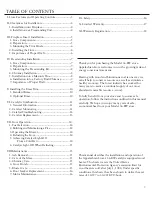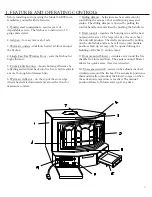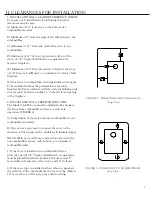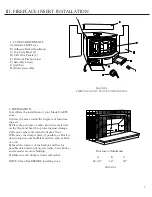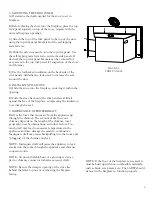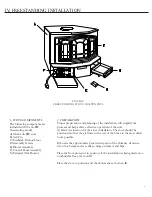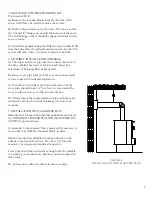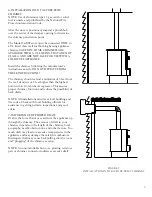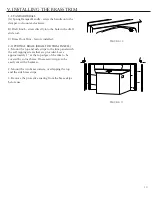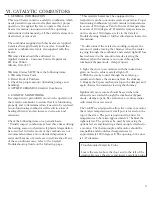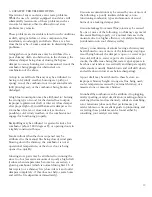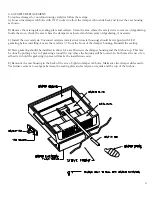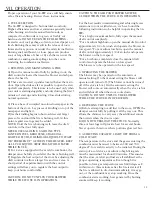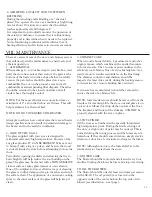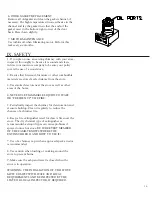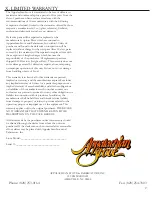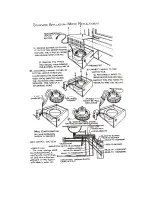
1. GENERAL INFORMATION
This wood heater contains a catalytic combustor, which
needs periodic inspection and replacement for proper
operation. It is against the law to operate this wood
heater in a manner inconsistent with the operating
instructions in this manual, or if the catalytic element is
deactivated or removed.
The combustors supplied with this heater are Applied
Ceramics Versagrid Catalytic Converter. Consult the
catalytic combustor warranty also supplied with this
heater.
Warranty claims should be addressed to:
Applied Ceramics - Customer Service Department
P.O. Box 29664
Atlanta, GA 30359
Warranty Claims MUST have the following items:
1. Warranty Claim Form
2. Dated Proof of Purchase
3. Check for proper amount (including postage and
handling)
4. APPLIED CERAMICS Catalytic Combustor
2. CATALYST MONITORING
It is important to periodically monitor the operation of
the catalytic combustor to ensure that it is functioning
properly and to determine when it needs to be replaced.
A non-functioning combustor will result in a loss of
heating efficiency and an increase in creosote and
emissions.
Check the following items on a periodic basis:
* Visually inspect combustors at least three times during
the heating season to determine if physical degradation
has occurred. Actual removal of the combustor is not
recommended unless a more detailed inspection is
warranted because of a decrease in performance. If any
of these conditions exist, refer to the Catalyst
Troubleshooting Guide on the following page.
VI. CATALYTIC COMBUSTORS
* This catalytic heater may be equipped with a
temperature probe to monitor catalyst operation. Proper
functioning combustors typically maintain temperatures
in excess of 500 degrees F and often reach temperatures
in excess of 1000 degrees F. If catalytic temperatures are
not in excess of 500 degrees, refer to the Catalyst
Troubleshooting Guide or further information located in
this manual.
* To determine if the catalyst is working, compare the
amount of smoke leaving the chimney when the smoke
is going through the combustor and catalyst light-off has
been achieved to the amount of smoke leaving the
chimney when the smoke is not routed through the
combustor (bypass mode - damper open).
1. Light the stove in accordance with the instructions
given on how to achieve catalyst light off.
2. With the smoke routed through the catalyst, go
outside and observe the emissions from the chimney.
3. Engage the bypass mechanism (open the damper) and
again observe the emissions leaving the chimney.
Significantly more smoke should be seen when the
exhaust is not routed through the combustor (bypass
mode - damper open). Be careful not to confuse smoke
with steam from wet wood.
The 36-BW was designed to allow the owner to monitor
the catalyst temperatures. A small port is located on the
top of the stove. The port is positioned to allow for
temperatures to be taken approximately 1” behind the
right catalyst. The port may be used by removing the
optional screw and inserting a thermocouple attached to
a monitor. The thermocouple and monitor should be
compatible and should read temperatures to
approximately 1800 degrees F. The opening in the stove
is 1/4” diameter.
11
Front Mounted Catalytic Probe
Locate the screw above the door and to the left of the
damper. Remove the screw and insert a catalytic probe.
Summary of Contents for 36-BW
Page 18: ......


